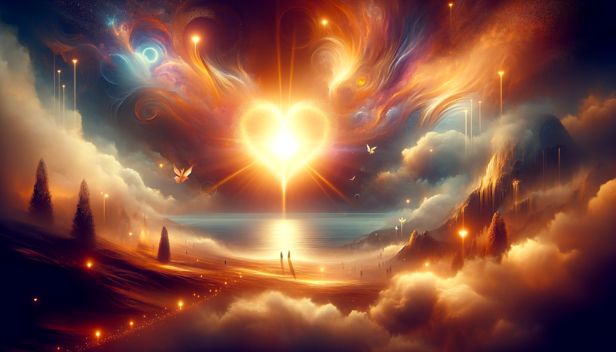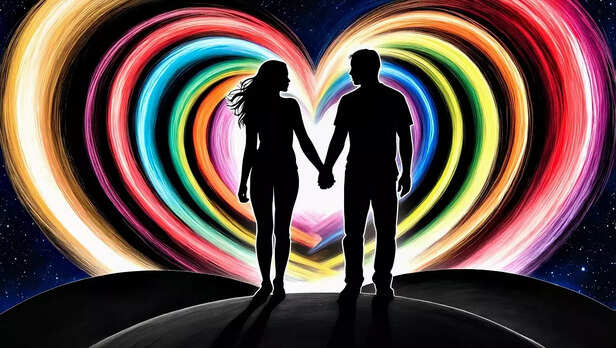Love Makes Us Human. The Gita Says It Makes Us Weak
Riya Kumari | Aug 27, 2025, 12:29 IST
( Image credit : Timeslife )
We’ve all been there. You’re staring at your phone like it’s the Bhagavad Gita itself, waiting for a text that says “goodnight", only to get a dry “gn.” And in that moment, you don’t feel like the noble, evolved, carbon-based life form science says you are. You feel… fragile. The kind of fragile where a bad emoji placement could send you spiraling into an emotional existential crisis.
We think love is our greatest strength. It makes us laugh in the middle of disasters, gives us courage when the world feels unbearable, and makes life something more than survival. But the Bhagavad Gita offers a sobering reminder: what we call love often isn’t pure love at all, it’s attachment. And attachment, Krishna warns, is not strength. It is weakness. This is not a call to become cold or loveless. It’s an invitation to look deeper. To ask ourselves: when we say “I can’t live without you,” are we really loving or are we clinging?

Love gives us the sense that we’re bigger than ourselves. When you love, you suddenly care about more than your own comfort. You’d sacrifice sleep, money, even pride, for someone else. That feels noble. It feels strong.
And in many ways, it is. Love, at its highest, is the energy that holds life together. But the problem starts when we confuse love with possession. The moment love becomes “mine,” it becomes fragile. And fragile things break easily.

In the Gita, Krishna explains the chain of downfall: Attachment leads to desire. Desire leads to anger. Anger leads to delusion. And delusion leads to ruin.
It sounds dramatic, but think of it: how many fights, heartbreaks, or sleepless nights have begun because someone didn’t love us the way we wanted? The love wasn’t the problem. The demand was. When we attach, we stop seeing the person, we see only our need. And when that need isn’t met, pain is inevitable.

So what’s the alternative? Krishna doesn’t say “don’t love.” He says: love without losing yourself. Care deeply, but don’t chain your worth to another’s approval. Be devoted, but not dependent.
Imagine this: you love someone, and they leave. Yes, it hurts. But it doesn’t destroy you. Why? Because your strength wasn’t built on clinging, it was built on understanding. That kind of love doesn’t make you weak; it makes you unshakable.

The Gita teaches that true love uplifts, it doesn’t drain. It frees both people instead of binding them in fear. It makes you capable of sacrifice without resentment, of closeness without suffocation, of joy without terror of loss.
Love should make you human, tender, kind, vulnerable. But attachment? That’s the part that makes us collapse. The wisdom is simple: if your love needs chains, it isn’t love.
Closing Thought:
Love is not weakness. Attachment is. Krishna’s wisdom doesn’t deny the heart, it protects it. To love someone without fear, to hold them without clutching, to walk beside them without losing your balance, that is the highest strength.
Maybe that’s the lesson: love makes us human. But learning how not to be broken by it? That’s what makes us free.
Why Love Feels Like Power

Love
( Image credit : Pixabay )
Love gives us the sense that we’re bigger than ourselves. When you love, you suddenly care about more than your own comfort. You’d sacrifice sleep, money, even pride, for someone else. That feels noble. It feels strong.
And in many ways, it is. Love, at its highest, is the energy that holds life together. But the problem starts when we confuse love with possession. The moment love becomes “mine,” it becomes fragile. And fragile things break easily.
Krishna’s Warning: The Trap of Attachment

Attachment
( Image credit : Pixabay )
In the Gita, Krishna explains the chain of downfall: Attachment leads to desire. Desire leads to anger. Anger leads to delusion. And delusion leads to ruin.
It sounds dramatic, but think of it: how many fights, heartbreaks, or sleepless nights have begun because someone didn’t love us the way we wanted? The love wasn’t the problem. The demand was. When we attach, we stop seeing the person, we see only our need. And when that need isn’t met, pain is inevitable.
Strength in Letting Go

Power
( Image credit : Pixabay )
So what’s the alternative? Krishna doesn’t say “don’t love.” He says: love without losing yourself. Care deeply, but don’t chain your worth to another’s approval. Be devoted, but not dependent.
Imagine this: you love someone, and they leave. Yes, it hurts. But it doesn’t destroy you. Why? Because your strength wasn’t built on clinging, it was built on understanding. That kind of love doesn’t make you weak; it makes you unshakable.
Love That Liberates, Not Weakens

Soulmates
( Image credit : Pixabay )
The Gita teaches that true love uplifts, it doesn’t drain. It frees both people instead of binding them in fear. It makes you capable of sacrifice without resentment, of closeness without suffocation, of joy without terror of loss.
Love should make you human, tender, kind, vulnerable. But attachment? That’s the part that makes us collapse. The wisdom is simple: if your love needs chains, it isn’t love.
Closing Thought:
Maybe that’s the lesson: love makes us human. But learning how not to be broken by it? That’s what makes us free.
